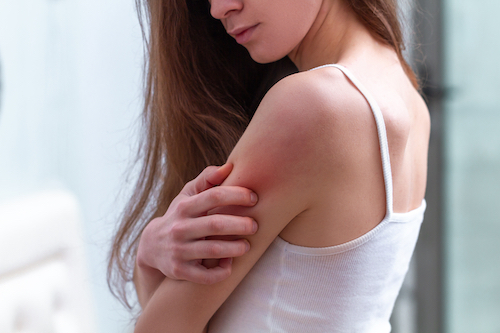Psoriasis, a common, chronic skin condition resulting from a rapid buildup of skin cells, affects more than seven million men, women, and children in the United States.
This autoimmune disorder often presents as red, raised, dry, and cracked scaly patches on various parts of the body, causing symptoms that range from mild itching to severe pain. While there’s no cure for psoriasis, multiple treatments can effectively relieve symptoms.
SkinSmart Dermatology, your favorite dermatologist in Sarasota, Florida offers insight below.
Understanding Psoriasis’ Varied Forms
Psoriasis is diverse in how it manifests in different patients. There are seven different types, each with its own symptoms. They are:
- Plaque Psoriasis: This is the most common form, affecting 80 percent of psoriasis patients, according to the American Academy of Dermatology. It results in red lesions covered in white scales and often appears on the elbows, knees, scalp, and back.
- Guttate Psoriasis: This type usually begins during childhood or early adulthood. It causes small red spots on the skin of the torso, arms, and legs. It’s typically associated with bacterial infections.
- Inverse Psoriasis: Developing in skin folds, such as the armpits, groin, or under the breasts, this form leads to bright-red lesions worsened by sweat and friction.
- Pustular Psoriasis: This form leads to white, pus-filled blisters surrounded by reddish areas of skin. It can be triggered by medications, ultraviolet light, pregnancy, or infection.
- Erythrodermic Psoriasis: The least common type, this form causes redness and scaling on the whole body. Left untreated, it could lead to serious illness.
- Nail Psoriasis: This type affects the nails, causing them to thicken, yellow, and develop small pits. It often manifests at the same time as a fungal infection.
- Psoriatic Arthritis: A combination of psoriasis and arthritis, it causes swelling, pain, and discoloration of the joints, as well as other skin-related symptoms.
Treatment Options
Treatment options focus on addressing current symptoms while interrupting the abnormal cycle that causes increased skin cell production.
They may include:
- Topical treatment with corticosteroids
- Vitamin D
- Retinoids, or similar oral medications
- Methotrexate
- Cyclosporine
- Light therapies
Patients can also find relief through home remedies. Examples include keeping the skin clean and moisturized, covering the affected areas while sleeping, and avoiding triggers like stress, smoking, and alcohol.
Schedule a Consultation Today
Living with psoriasis can be challenging, but with a well-planned treatment approach, effective relief is possible.
If you need help managing psoriasis, request a consultation with the experienced team at SkinSmart Dermatology.
Please call us at 941-308-7546 or fill out an online contact form. From our office in Southern Florida, we can guide you toward healthier skin.


